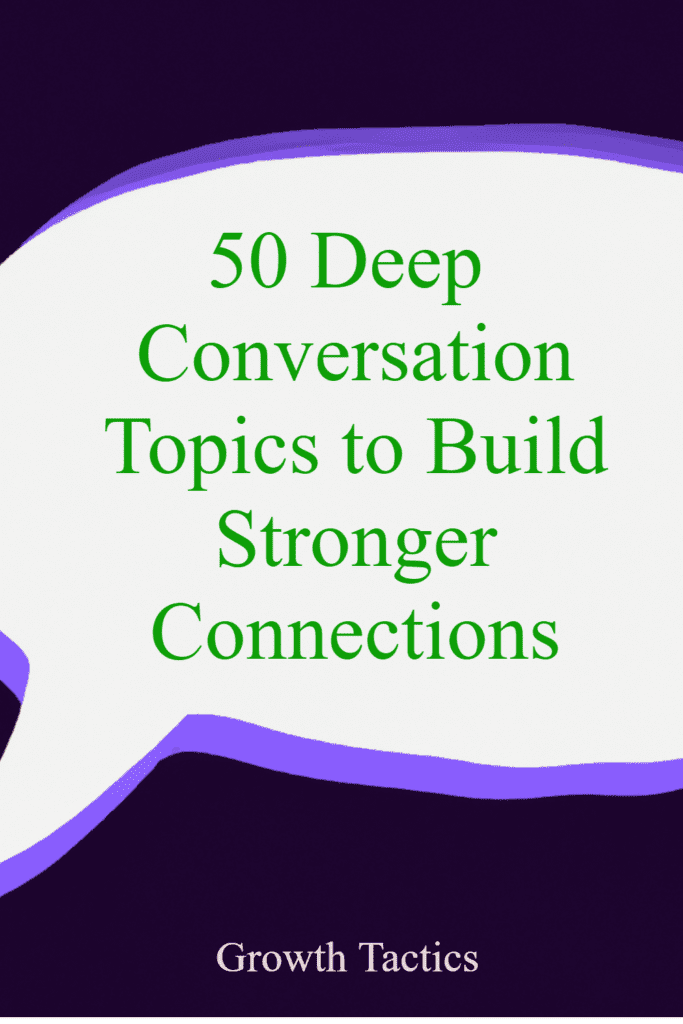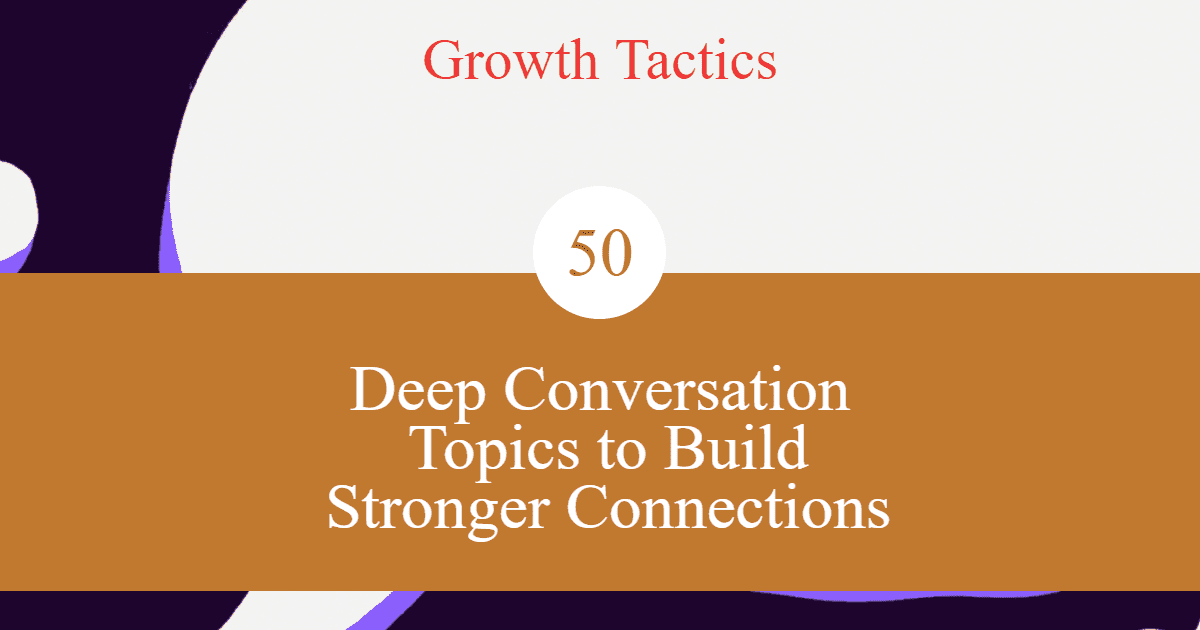Have you ever been in a conversation, only to realize that you’re merely exchanging pleasantries as a way to pass the time? You’re not alone. True, meaningful encounters are often overshadowed by simple small talk. This guide is here to help you navigate through the art of deeper discussions, foster more meaningful connections, and strengthen existing relationships. Let’s toss out the small talk and dive in, whether you’re chatting with an old friend or a stranger!
Jump To Section
The Art of Conversation: An Introduction
Thinking back to your childhood, you likely recall your parents asking, “How was your day?” and responding with a simple, “It was fine”. That’s not because your day was uneventful, but because it’s instilled in us to answer complex questions with generic, easy responses. But we’re not children anymore; it’s time we become pioneers of our own conversations.
The Power and Impact of a Deep Conversation
Imagine you’ve just met someone. You ask what they do for a living, they tell you. You make a comment about their line of work, and they respond. And just like that, the conversation has gone stale. Deeper topics can unveil a person’s aspirations, and fear, and highlight your own personality. Discussing serious topics doesn’t make you a therapist, but it does elevate the level of authenticity.
How to Kick Off a Deep Conversation Starting With a Test Drive
Initiating a deep conversation can seem daunting. But it isn’t about having an encyclopedia of ponder-provoking questions. It’s about gradually steering a casual talk towards meaningful avenues. Discussing the world around us, or the happenings in your life can lead to a more profound exchange.
Deep Conversation Topics
Here are 50 deep conversation topics, broken down into categories of Partner, Stranger, Friend, Family, and Coworker. Each topic is designed to help you connect with others in a more meaningful way.
Partner
- Defining Love: What does it mean to truly love someone–is it a feeling or a choice?
- Deal Breakers in Relationships: Discuss each other’s non-negotiables in a romantic partnership.
- Love Languages: Identify each other’s love languages to better understand how to support one another.
- Future Goals Together: Explore the direction your relationship is going, including marriage and children.
- Shared Hobbies: Find activities that both partners can enjoy together, fostering a stronger bond.
- Personal Growth and Development: Discuss how to support one another in achieving personal goals.
- Coping with Stress: Identify healthy ways to support one another during stressful times.
- Trust and Boundaries: Articulate the importance of trust and establish boundaries in your relationship.
- Learning from Past Relationships: Reflect on lessons learned from previous relationships and how to grow together.
- Spiritual Beliefs: Share your belief system and how it impacts your perspective on life and experiences.
Stranger
- Travel Experiences: Discuss meaningful or life-changing adventures to different parts of the world.
- Current Events: Delve into issues happening globally to understand the perspectives of others.
- Influential Books: Share books that have had a significant impact on your outlook on life.
- Cultural Upbringings: Discuss how your cultural background has shaped your worldview.
- Unexpected Kindness: Share stories of receiving or offering kindness to a stranger.
- Fascinating Documentaries: Talk about documentaries that helped you gain new insights or knowledge.
- Personal Passions: What activities inspire and energize you?
- Art and Music: Explore feelings evoked by different forms of art and music.
- Life Lessons: Share the most valuable lesson life has taught you thus far.
- Human Nature: Discuss your opinions on the driving forces behind human behavior.
Friend
- Unwavering Support: Remember times your friend has supported you or when you supported them through a difficult situation.
- Forgiveness and Apology: Have you ever had a falling out or disagreement? Discuss its resolution and the importance of forgiveness.
- Bucket Lists: Share your aspirations and discuss supporting each other in achieving them.
- Ethical Dilemmas: Discuss real or hypothetical scenarios that challenge your moral values.
- Vulnerability: Share an experience when you felt vulnerable and how it affected you.
- Regrets and Lessons: Discuss past regrets and the lessons you’ve learned from them.
- Influential People: Share stories of people who have impacted your life positively.
- The Power of Gratitude: Discuss the benefits of expressing gratitude and recognizing the good in life.
- Elements of a Strong Friendship: Deliberate on what makes a friendship powerful and lasting.
- Philanthropy and Giving Back: Explore the importance of giving back and share your experiences.
Family
- Childhood Experiences: Reflect on events during your upbringing that left a lasting impact.
- Family Traditions: Share the stories behind your family rituals and their importance.
- Connecting with Ancestors: Discuss your family history and what you’ve learned from your ancestors.
- Sibling Bonds: Talk about the unique bond between siblings and the value of that relationship.
- Parenting Styles: Reflect on your parents’ parenting styles and how they influenced your own approach.
- Missed Opportunities: Discuss moments when you wish you could’ve supported a family member in a more meaningful way.
- Family Dynamics: Share how your family interacts, your role within the family, and the effect on your relationships.
- Generational Wisdom: Discuss lessons passed down from older family members and their significance.
- Managing Conflict: How does your family deal with conflict, and what can be improved?
- Envisioning the Future: Discuss the future of your family and the legacy you want to leave behind.
Coworker
- Work-Life Balance: Share strategies for balancing personal life with professional responsibilities.
- Inspirational Leaders: Discuss key qualities of inspiring leaders, including real-life examples.
- Team Building: Share thoughts on how teamwork can improve within your workplace.
- Overcoming Workplace Challenges: Discuss shared obstacles and strategies for managing them.
- Achieving Professional Goals: Ask about each other’s career goals and what steps are being taken to achieve them.
- Office Culture: Identify the best aspects of your workplace culture and areas that need improvement.
- Influence of Technology: Discuss the impact of technology on your industry and job.
- Learning from Past Experiences: Share insights gained from previous work experiences.
- Decision-Making: Discuss how to make well-informed decisions in difficult situations.
- Stress Management: Share helpful stress management techniques for maintaining sanity during busy times at work.
The journey to deeper connections begins with a willingness to dive into meaningful topics. Engaging in profound conversations invites understanding, growth, and trust across all relationships in your life.
Sailing Against the Wind: Staying Afloat in the Sea of Small Talk
Starting conversations at a new gathering gives jitters to the best of us. Ever found yourself among strangers, grasping for topics? It feels like casting a fishing line into the deep sea, only to realize you’ve left all your bait back home. We’ve all relied on the old “Nice weather, isn’t it?” line.
Deep conversations with strangers can feel like you’re sailing against the wind. You’re in a stormy sea, struggling to steer towards meaningful dialogue. I’ve faced these challenges myself. But remember, we’re all in the same boat.
Next time, take a deep breath and smile. We all struggle to move past small talk. Think of the insights and connections you’ll miss if you don’t try. Start small; mention a book you recently read, or ask about their favorite holiday spot. Slowly, the conversation will flow easier. Small ripples create big waves, leading to genuine connections. Doesn’t that sound worthwhile?
The Art of Listening: More Than Just Waiting Your Turn
Conversation is like a symphony. It’s richer when we truly listen, not just wait to speak.
At a friend’s gathering, I wanted to share my Andes vacation stories. But I met Sarah, who volunteered as a teacher in a remote village. While eager to share my own tales, I listened. Sarah’s stories of resilient children and kind villagers captivated me. I started out waiting to speak, but ended up traveling through her experiences.
That night, I learned something big. Conversation isn’t a game of ping-pong. It’s a dance. Sometimes we lead, sometimes we follow.
When we listen deeply, we build respect and understanding. We learn, grow, and connect. So next time, pause and listen. Don’t just plan your reply. You might find yourself on an unexpected journey, creating a beautiful symphony together.
After all, conversations are about the orchestra, not just the solo.
Practical Exercises to Improve Deep Conversation Skills
Building deeper conversation skills takes practice. Here are some exercises to try out:
1. Reflective Listening Exercise
Objective: Enhance listening skills and show genuine interest.
- Instructions:
- Pair up with a friend or family member.
- One person shares a recent experience or story for 3-5 minutes.
- The listener practices reflective listening by summarizing what was said and asking follow-up questions.
- Switch roles and repeat.
2. Open-Ended Questions Drill
Objective: Develop the ability to ask questions that lead to deeper conversations.
- Instructions:
- Think of a recent topic discussed with someone (e.g., a movie, a book, a vacation).
- Write down 5 open-ended questions related to the topic (questions that cannot be answered with a simple “yes” or “no”).
- Practice using these questions in future conversations.
3. Story Sharing Session
Objective: Build connection through shared experiences.
- Instructions:
- Gather a group of friends or colleagues.
- Each person takes turns sharing a personal story that reveals something about their values or experiences.
- After each story, others can ask questions to delve deeper into the person’s story and feelings.
4. Ethical Dilemmas Challenge
Objective: Explore moral values and enhance critical thinking.
- Instructions:
- Prepare a list of ethical dilemmas or controversial topics.
- Discuss these dilemmas with a partner or group, focusing on understanding different perspectives.
- Encourage respectful debate and ask probing questions to understand the reasoning behind each person’s view.
5. Empathy Mapping
Objective: Improve empathy and emotional intelligence.
- Instructions:
- Choose a public figure or a character from a book/movie.
- Create an empathy map by discussing or writing out what the person may be thinking, feeling, saying, and doing.
- Use this exercise to practice putting yourself in someone else’s shoes during conversations.
6. Silence and Observation
Objective: Learn to appreciate the power of silence and non-verbal cues.
- Instructions:
- In your next conversation, practice being comfortable with silence. Allow pauses without rushing to fill them.
- Observe the non-verbal cues of the person you’re talking to, such as body language, facial expressions, and tone of voice.
- Reflect on how these cues add depth to the conversation.
7. Weekly Deep Conversation Topics
Objective: Incorporate deep conversations into regular interactions.
- Instructions:
- Select one topic from the provided deep conversation topics list each week.
- Implement these topics into your conversations with different people (partner, friends, family, coworkers).
- Reflect on each conversation to see what worked and what could be improved.
The Takeaway
- Mastering the art of deep conversations can lead to more meaningful relationships.
- Deep conversations aren’t reserved for your psychologist or a romantic partner – anyone can dive into it.
- Start small – discuss someone’s day or the world around us.
- Your conversational journey can be gradual – start with open-ended questions.
- Activate listening is key – it’s not a monologue but a dialogue.
- Foster deeper connections by having deep conversations in various realms of your life – with your partner, at your workplace, or a stranger at a party.
Join us in this journey and turn small talk into meaningful dialogues that strengthen your connections, help you understand others better, and ultimately, allow you to converse sincerely and deeply.








